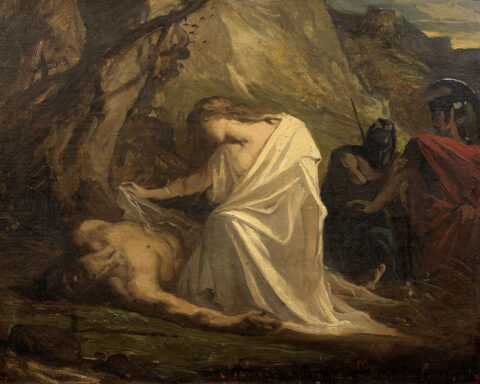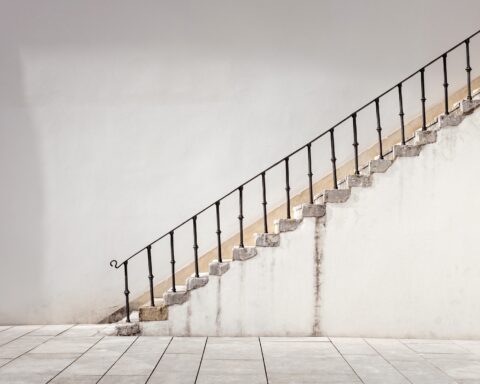She dreamt, but not much of it at night, when visions and curdled stories present themselves in pieces demanding daytime hours for puzzling. Zusa’s memory dreams were broader than the hours captured in total darkness. In fact, they blanketed her days with an ethereal fog. Resigned, she allowed the edges of her life to keep their blurry form as if this would keep the past lurking in the background.
But the past fished for her, flitting across her surface like mayflies, touching down in the oddest of places. She couldn’t predict when and where to armor up. Pretend she didn’t see. The red end of it tucked around her toothbrush, or her computer. Tailed around the steering wheel when she drove to work in the morning. She used to reach for it, as if there could be something solid to catch between her fingertips. A lifeline leading to an answer to her question— how do I end this? A stray strand from a red shirt, a train of thought dropped from her persimmon dusting cloth, a thread of something separated from the whole.
But each tug on the thread, no matter how gently she pulled, brought her past along with it, fish lined. A series of barbed hooks. Images that bloodied her fingers when she fought to work them off the line. Zusa threw what she could release back into the frothy sea of forgetting.
With all that tossing, she held onto what she could. Bits of the present managed to float free from the haze. She treasured what she could; plucked gratefuls from the murk of forgetting. Wore them on her chest like campaign buttons. Something to believe in. Her little house nestled in what should have been beauty. Tree-lined city paths where she walked her pup before work. Her favorite mug that dropped but made it through unbroken. She gathered these small, clear things and made them her examples. Asked them to be louder than any whispers from before. Middle age should have given her years of buffer yet there remained that small part of herself still infantile. No matter how much she raged or cajoled or nurtured.
She knew her job situated itself in the cove of a dead end, the hours calculated into a barely viable paycheck. Half of which went to her chihuahua. A tiny slip of a thing whose yap filled the apartment in a way that kept Zusa irritable company. Billiard with his underbite almost bigger than the bulk of himself. He could leap five times his height into the air for a tossed treat. Zusa filled the dark evenings of the northeast with his barks and jumps while she sat on the couch, exhausted. Her polar opposite in a bug-eyed, overly energetic canine familiar.
Zusa loved Billie in the way that only the truly lonely could love pets. Twisting them into human companions whose needs, whether real or imagined, color the world with a certain clear purpose. On that surface, Billie looked as if he madly loved Zusa in return. He sprang at her as soon as she swung the door open after work. Leapt onto her chest, tap-danced his way across her shoulders and arms as he tasted her long-departed everything. Eyes and ears and lips and neck. She pretended to fight him off but really, only wanted to pull him closer in. Consume him, if she could. His exuberant greetings stripped the mundane world from her, one lick at a time. A home coming. A christening of sorts.
But Billie only needed salt, going after her skin with a passionate need that had nothing to do with caretaking. This, Zusa knew as well, but forgave him for it.
The first time she pulled on a memory’s long strands, they unspooled around her in piles of tangles. She knew her job at once – put it all back together, wind it clean and neat for selling back to the public. Not unlike her day job, where she re-packaged soundbites and wonky information into readable position papers for higher ups to easily understand. Zusa found it difficult, after only applying one small tug to the thin filament, to wind the mess of her father’s martinis away from the dangerous loops that surrounded her ankles. Like Alice, her own hands shrunk so small the strand of memory noosed into a thick scratchy rope in her grip. Her feet morphed, too. Small enough to fit back into the shiny black patent leather of her old MaryJanes. Her base too tiny and wobbly to balance each and every one of her years. These were the feet of a child made to dress up for church while her mother, too exhausted from all the noise of children, beached herself on the threadbare red couch in the TV room. Close enough to God, Zusa guessed, to miss out on the weekly sermon.
Loops caught on the rough warts erupting once again on Zusa’s hands. All those years of hiding them in her lap, fear of classmate’s seeing the meticulously tied knots around each of her raised lesions. “Who are you touching to get tainted like this?” Her mother’s wrath pulling the ends so tightly Zusa couldn’t breathe. Ligation with red thread, strangling more than a child’s ugly blemishes.
Years of winding gave Zusa practice with dexterity, which she turned first into hobbies like the art of collage, where her teenage hands ripped tiny pieces down to size before rearranging them into barely discernible wall-sized images. Then the workforce, where so many companies clamored for her front desk efficiency. Her innate ability to take whatever crashed through the door or email and organize them neatly into their respective piles. In box, out box. Items for later.
The end – or was it the beginning – of the thread began appearing in places she thought she’d be immune. On her walks down the wood-chipped path from the park, where strings hung like lichen from branches, causing her to duck her head to miss them. Sometimes frayed, as if forced too long to match the eye of someone’s slender needle. Other times, the sharp ends slipped under her nails. A torturous moment where a yank was not enough to dislodge all that embedded itself within her. Tweezers were necessary, though upon extraction the thread went limp, reminding Zusa how crazy she was. Thinking a piece of thread could pierce the undersides of her tender skin. Leave a mark so deep it would be futile to complain about.
Erasure, then, was necessary, and Zusa welcomed the fog settling in. That little bit of woozy that she wound expertly into a soothing cloud, protecting her from everything. No threads could be seen fraying when she blurred all her edges. No envelope arrived in the mail with that bit of floss peaking its red end out of the flap, tagging her bills to the ones her parents once owed. No clear sound of her father’s disappointment murmuring from the tape measure on the edge of his workbench. Measuring her worth along the rough edges of lumber stacked waiting in his shop, no project equal to the cost of the precious board feet.
She cut it with scissors. Shortened it whenever she could. A snip of her mother’s soft breath, telling Zusa she is going to hell because she refuses to accept Jesus. A slice of her father leaning into her, hard-eyed, stating in his overly- calm voice “I do not emote.” Her own words blocked by gasping sobs and tears. “And I don’t know why the hell you feel the need to.”
Her attempts to clip and sever only acted like pruning. Soon there were sprouts of it everywhere she looked. In her work bag. In the butter dish. She picked them out of the shower drain where they joined the short, grey hairs that leapt from her head as if saving themselves from a sinking ship.
Zusa found them twisted in Billie’s tiny dog piles. She imagined he ate them to protect her, digesting parts of her childhood because she couldn’t figure out how to. A few bites of thread couldn’t hurt a dog, she guessed. Deftly, she scooped them up into plastic dog bags, deposited them in the cans by the curb. Good riddance to bad rubbish, she heard her mother say, though not thrown directly at her this time. And a bit lighter than Zusa ever remembered. A stray thread easily picked from a collar.
She never told the counselors, the life coaches, the EAP insurance supporters about the threads. They asked about her past, her mother, her father, her siblings who held the same martinis in their knuckled hands. Zusa dug into her past with painful duty, imagining what her life would look like, feel like, if not so tethered to what she could not let go. She kept the unraveling mostly to herself. Wove their ends back into her living, a hairshirt of sorts that cloaked her depression.
She came home one spring day and found Billie tangled in a mass of it. An angry red snarl she had thought well-hidden and long forgotten. The scissors she ran to find only threatened in her hands. Even Billie’s bug-eyed chihuahua eyes recoiled from the sharpness of the metal. He knew the glossy -eyed vision of his owner and doubted her precision.
To free him, Zusa realized she had to clear the fog dreams. Gather all the threads of her past and see them for what they were — cotton and polyester. Nothing strong enough to sew what was to what now is. Not something that could tie done what could be.
Cross-legged beside her faithful pup, Zusa began the unraveling but this time, she brought the cords closer than ever before. Let them slide braille-like over the tips of her fingers. Threads and fingerprints ridging and whorling and valleying together until she felt the pattern of herself emerging. She wound the threads around herself, each long stretch of it freeing him.
Zusa draped the longer lengths over the couch and chairs and end tables. Some pieces so long—her young adult years—she wound them into skein-like batches. Billie scrambled free, barking his relief. She took a hunk of it, cut off a jump rope length. Tied one end to the bathroom doorknob while she twirled the other end in long broad sweeps, scooping the air in the arc of a childhood pastime. Billie, recovered, leapt up and over the line each time it came around, head bobbing in playful anticipation.
The trick, she realized, was to see it. Not to attempt to wind it into tidy skeins. Not to erase it with fog-like vision. Each swing of the past under her pup’s paws brought her closer to a realization. This is what the therapists and friends and lovers all meant when they advised her to “let it go”. They really meant to say, dive right in.
Zusa and Billie searched for them then. A playful game of fetch colored by the scent of finding lost bones. They nosed around the furniture, in her closets and drawers, sniffed out the pages of her journals and the half-completed resume open on her computer on the counter. They kept at it for days, until every loose end was routed out of hiding.They piled them in the living room. Zusa used her hands and dustpan and shovel, Billie yanked and tugged with his teeth. Clamped tight and head snapping, shaking his prey into submission. Billie barked for a pet and a scratch and Zusa rewarded him, of course.
Billie and Zusa sat on the couch, admiring their work. A heap of tangled dreams, harsh voices and lost causes, corralled and silenced. No longer able to work their way into dark hidden corners. Billie danced on the cushion beside her, yapping his approval.



